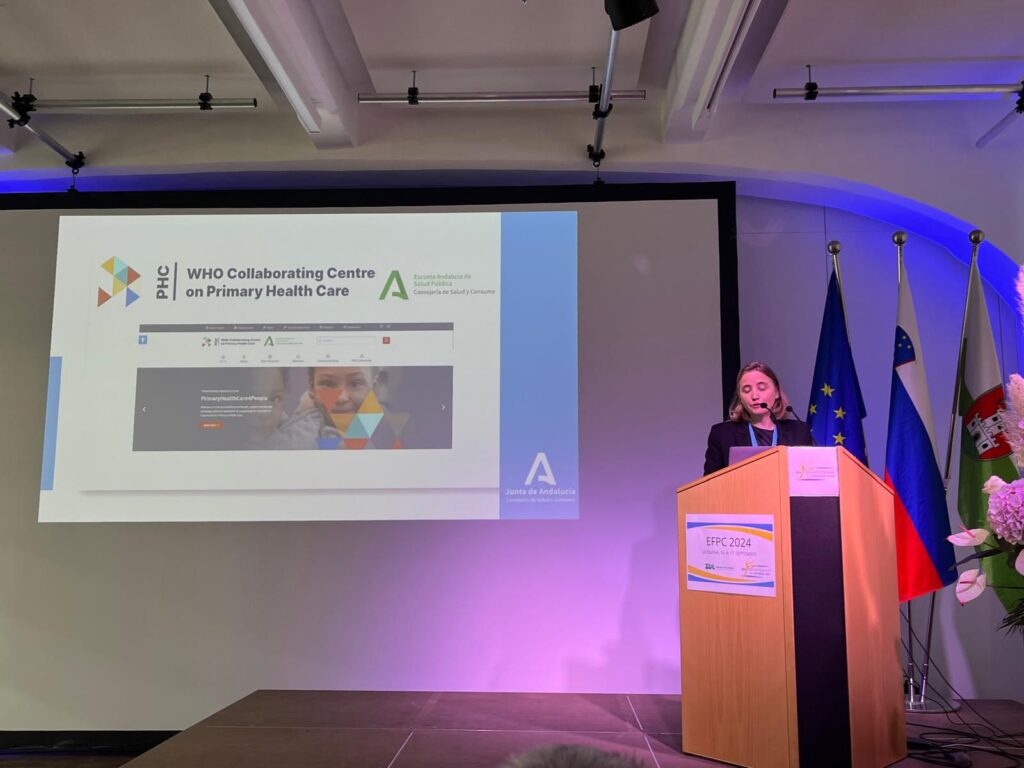The Andalusian School of Public Health (EASP) has been invited by the World Health Organization (WHO) to participate in the European Forum for Primary Care being held this week in Slovenia. The European Forum has dedicated a space to the work carried out by WHO through its Collaborating Centres.
As a WHO Collaborating Centre, the EASP has developed the web platform http://primaryhealthcare4people.org/, which will contribute to the implementation of the Primary Health Care (PHC) Strategy in countries.
The platform, presented by Sergio Minué and Diana Gosálvez, coordinators of the WHO Collaborating Centre at the EASP, provides professionals with resources and tools focused on training and best practices. The goal of the platform is to facilitate collaboration among health professionals from different countries.
The platform includes a Virtual Community of Practice in PHC, which is expected to bring together various working groups to foster knowledge exchange and international cooperation. This community will be the starting point for network collaboration among PHC collaborating centres.
What is Primary Health Care (PHC)
PHC is “an approach to health that involves the whole of society, aiming to achieve the highest possible level of health and well-being, and its equitable distribution by focusing on people’s needs as early as possible along the continuum, from health promotion and disease prevention to treatment, rehabilitation, and palliative care, as close as feasible to people’s everyday environment.” WHO and UNICEF, A vision for primary health care in the 21st century: Towards UHC and the SDGs.
PHC is the most inclusive, equitable, cost-effective, and efficient approach to improving physical and mental health, as well as social well-being.
WHO Member States have committed to renewing and expanding primary health care as the cornerstone of a sustainable health system that ensures Universal Health Coverage, achievement of health-related Sustainable Development Goals (SDGs), and health security. This commitment has been formulated and reiterated in the Declaration of Astana, World Health Assembly Resolution 72/2, the 2019 Universal Health Coverage monitoring report, and the United Nations General Assembly High-Level Meeting on Universal Health Coverage.
Diana Gosálvez during the presentation of the platform for WHO
Sergio Minué during the presentation of the EASP as a WHO Collaborating Centre
WHO Collaborating Centre since 1989
The Andalusian School of Public Health (EASP) was designated as a WHO Collaborating Centre in 1989. Currently, and until 2025, it serves in the area of 'Primary Health Care (PHC).' Its main objectives include promoting professional exchange, coordinating, and advising countries on Primary Health Care. The EASP is the only WHO Collaborating Centre in Andalusia, one of 10 in Spain, and one of 822 worldwide.
As a WHO Collaborating Centre, the EASP focuses its work on three main areas: technical advice for the development of reports, guidelines, and other documents; strengthening integrated health service networks and sharing best practices; and providing technical assistance to promote health systems based on PHC.
